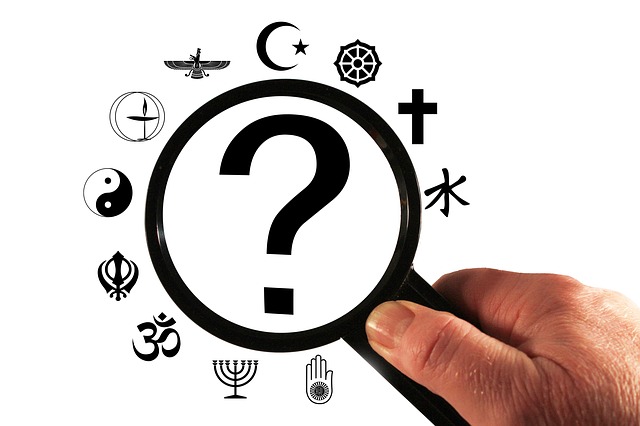clear

source:
geralt / Pixabay
Religion is a worldwide phenomenon. A multitude of religions have shaped the world we live in. It is therefore important that education should cover the subject because of its impact on history and modern society.
The problem is in finding a teacher and students where none have been exposed to indoctrination by family, society and religious leaders.
Personally I am now an atheist, but I was raised as a devout Catholic, even being educated by Jesuit priests for 7 years. Looking back, I realised that I had not been educated, I’d been indoctrinated. And when I realised that, I was upset that from my earliest years my mind had been bent to a certain way of thinking.
I consider myself very lucky that I was also taught to think, and that over many, many years I thought my way through the subject to where I am now. That process was actually fraught with danger, for even doubting the faith is a serious sin for Catholics.
I am sure that there are many who, like me, grew up and thought everything through and decided that their religion was indeed a useful adjunct to their lives. But it is clear that “indoctrination rules” in most cases.
So can religion be taught objectively? Assuming that a child can be free of outside influences (otherwise the built-in bias will make things very difficult for the child) then classes should begin no earlier than age 11.
I’d ask the class to talk about their parents and grandparents and to think about the generations that came before, and before, and… So – we have a starting point – some sort of creation story. Then ask for suggestions for creation, was it only people? Wouldn’t the same apply to animals? Plants? The universe? Where does it all come from?
And move on to ask about thunder and lightning – is it scary? And broaden out to natural disasters – fires, floods, earthquakes. They destroy and are frightful things. Is there an explanation? Try to lead the class into wondering if there may be something beyond their ken that controls these bad things. And then maybe it is possible to do something to appease them and minimise their impact.
So we now have creation and unexplained bad things. By such means it should be possible to build a strong case for the basis of having a religion.
From there it is a case of describing how various religions tackle creation, appeasement and so on. And for each ask the class whether these are reasonable ideas and why / why not.
Get them to THINK.
 0
0
clear
I think it only fair and ethical to announce my bias upfront. I am an avowed and ardent atheist although I was raised Christian. I strongly believe religion absolutely should be taught in primary and secondary schools. One major job of a good basic, formative education is to prepare its students for life and everyone at some point or another will be exposed to religious belief systems. Not teaching about religion would be akin to not informing our kids about the Internet and its risks and rewards. Avoiding the topic of religion in conversations about ethics and social studies would be to institutionalize ignorance. However, here is the crucial caveat. That education should not be about indoctrination into a belief system, even the belief system of atheism. It should attempt to foster tolerance, awareness of self and others and, ultimately, promote a solid understanding of how religious belief shapes the world around us today. It should equip students with the ability to think for themselves, decide for themselves and accept the decisions others make too.
 0
0
clear
 Mark Hart
6 years, 3 months ago
Mark Hart
6 years, 3 months ago
Religion is a very personal foremost thing anybody can learn. I think that religion should be taught at Primary and Secondary levels in schools. But I believe if there is a mix of different communities and believes in a classroom then it must be left for parents to teach their children about the religion.
Every religion/ belief in the world needs to be respected, so teaching all the students about one religion or the amalgam of religions is not just. The reason is the contradictions between faiths. For example, it is the belief of a Muslim, that there is no God but One Who has not any wife or a son. And if they are taught that Jesus is son of god, it will make them none but confused.
So religion should be taught in schools only when the majority belongs to one set of believes. In addition, when the majority is taught about their religion they should also be taught to think critically.
 0
0
clear

Sign up to post or vote on answers.
Improveo will help systemize your knowledge.
